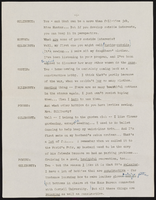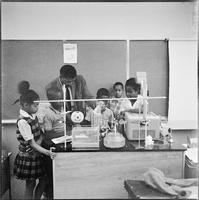Search the Special Collections and Archives Portal
Search Results
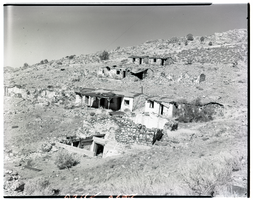
Film transparency of a ghost town, Delamar, Nevada, 1956
Date
1956
Archival Collection
Description
A view of some of the abandonded buildings on a hillside in Delamar, Nevada. One of the structures has a covered porch Delamar, Nevada, nicknamed The Widowmaker, is a ghost town in central eastern Nevada, USA along the east side of the Delamar Valley. During its heyday, primarily between 1895 and 1900, it produced $13.5 million in gold. In 1889, prospectors John Ferguson and Joseph Sharp discovered gold around Monkeywrench Wash. A mining camp was then born west of the Monkeywrench Mine. It was called Ferguson. In April 1894, Captain Joseph Raphael De Lamar bought most of the important mines in the area and renamed the Ferguson camp as Delamar. In the same year, a newspaper called the Delamar Lode began publication and a post office was opened. Soon, the new settlement boasted more than 1,500 residents, a hospital, an opera house, churches, a school, several businesses and saloons. Most buildings were made of native rock. By 1896, the Delamar mill was handling up to 260 tons of ore daily. Water for the camp was pumped from a well in Meadow Valley Wash, some twelve miles away. Supplies and materials traveled even further, by mule team over mountainous terrain from the railroad head at Milford, Utah, which was 150 miles from Delamar. Silicosis The gold in the Delamar mines was embedded in quartzite which when crushed created a fine dust. Miners breathing the dust often developed silicosis and the town became known as a "widow-maker." Many ruins now stand semi-intact in the Delamar ghost town region. Foundations can easily be seen from adjacent hills. There are two graveyards, which have been vandalized. The area is honeycombed with mines and mineshafts, but in recent years the main shaft has been blasted closed. Wild horses roam the area. The nearby dry lake is known to pilots as Texas Lake because its outline resembles the state of Texas.
Image
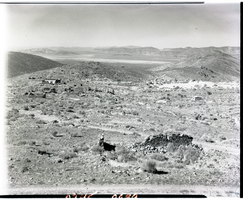
Film transparency of a ghost town, Delamar, Nevada, 1956
Date
1956
Archival Collection
Description
A view of some of the abandonded buildings in Delamar, Nevada, taken from a nearby hill. Delamar, Nevada, nicknamed The Widowmaker, is a ghost town in central eastern Nevada, USA along the east side of the Delamar Valley. During its heyday, primarily between 1895 and 1900, it produced $13.5 million in gold. In 1889, prospectors John Ferguson and Joseph Sharp discovered gold around Monkeywrench Wash. A mining camp was then born west of the Monkeywrench Mine. It was called Ferguson. In April 1894, Captain Joseph Raphael De Lamar bought most of the important mines in the area and renamed the Ferguson camp as Delamar. In the same year, a newspaper called the Delamar Lode began publication and a post office was opened. Soon, the new settlement boasted more than 1,500 residents, a hospital, an opera house, churches, a school, several businesses and saloons. Most buildings were made of native rock. By 1896, the Delamar mill was handling up to 260 tons of ore daily. Water for the camp was pumped from a well in Meadow Valley Wash, some twelve miles away. Supplies and materials traveled even further, by mule team over mountainous terrain from the railroad head at Milford, Utah, which was 150 miles from Delamar. Silicosis The gold in the Delamar mines was embedded in quartzite which when crushed created a fine dust. Miners breathing the dust often developed silicosis and the town became known as a "widow-maker." Many ruins now stand semi-intact in the Delamar ghost town region. Foundations can easily be seen from adjacent hills. There are two graveyards, which have been vandalized. The area is honeycombed with mines and mineshafts, but in recent years the main shaft has been blasted closed. Wild horses roam the area. The nearby dry lake is known to pilots as Texas Lake because its outline resembles the state of Texas.
Image
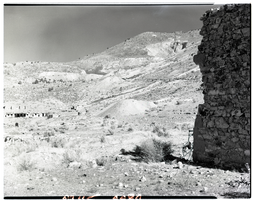
Film transparency of a ghost town, Delamar, Nevada, 1956
Date
1956
Archival Collection
Description
Some of the abandonded buildings in Delamar, Nevada. A tailing pile from one of the mines is visible in the center of the photograph. A stone structure is visible on the right side of the photograph. Delamar, Nevada, nicknamed The Widowmaker, is a ghost town in central eastern Nevada, USA along the east side of the Delamar Valley. During its heyday, primarily between 1895 and 1900, it produced $13.5 million in gold. In 1889, prospectors John Ferguson and Joseph Sharp discovered gold around Monkeywrench Wash. A mining camp was then born west of the Monkeywrench Mine. It was called Ferguson. In April 1894, Captain Joseph Raphael De Lamar bought most of the important mines in the area and renamed the Ferguson camp as Delamar. In the same year, a newspaper called the Delamar Lode began publication and a post office was opened. Soon, the new settlement boasted more than 1,500 residents, a hospital, an opera house, churches, a school, several businesses and saloons. Most buildings were made of native rock. By 1896, the Delamar mill was handling up to 260 tons of ore daily. Water for the camp was pumped from a well in Meadow Valley Wash, some twelve miles away. Supplies and materials traveled even further, by mule team over mountainous terrain from the railroad head at Milford, Utah, which was 150 miles from Delamar. Silicosis The gold in the Delamar mines was embedded in quartzite which when crushed created a fine dust. Miners breathing the dust often developed silicosis and the town became known as a "widow-maker." Many ruins now stand semi-intact in the Delamar ghost town region. Foundations can easily be seen from adjacent hills. There are two graveyards, which have been vandalized. The area is honeycombed with mines and mineshafts, but in recent years the main shaft has been blasted closed. Wild horses roam the area. The nearby dry lake is known to pilots as Texas Lake because its outline resembles the state of Texas.
Image
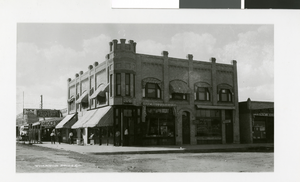
Photograph of businesses on Fremont Street, Las Vegas, Nevada, circa 1910s-1920s
Date
1910 to 1929
Archival Collection
Description
The northwest corner of Fremont and First Streets in Las Vegas, Nevada. "Wharton Drug Co."printed on photo in lower left corner.
Image
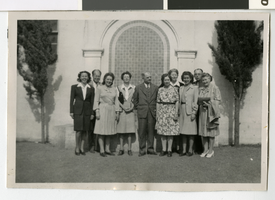
Photograph of K.O. Knudson and others, Las Vegas (Nev.), early 1940s
Date
1940 to 1944
Archival Collection
Description
A group of people posed outside of a building. K.O. Knudson is identified as the man in the center and the other individuals are not identified.
Image

Postcard of Bisbee, (Ariz,), 1900-1920
Date
1900 to 1920
Archival Collection
Description
Postcard of Bisbee, (Ariz,), 1900-1920
Image
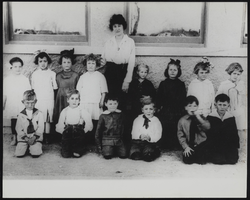
Las Vegas kindergarten class: photographic print
Date
1917
Archival Collection
Description
From the UNLV Libraries Single Item Accession Photograph Collection (PH-00171)
Image
Pagination
Refine my results
Content Type
Creator or Contributor
Subject
Archival Collection
Digital Project
Resource Type
Year
Material Type
Place
Language
Records Classification

